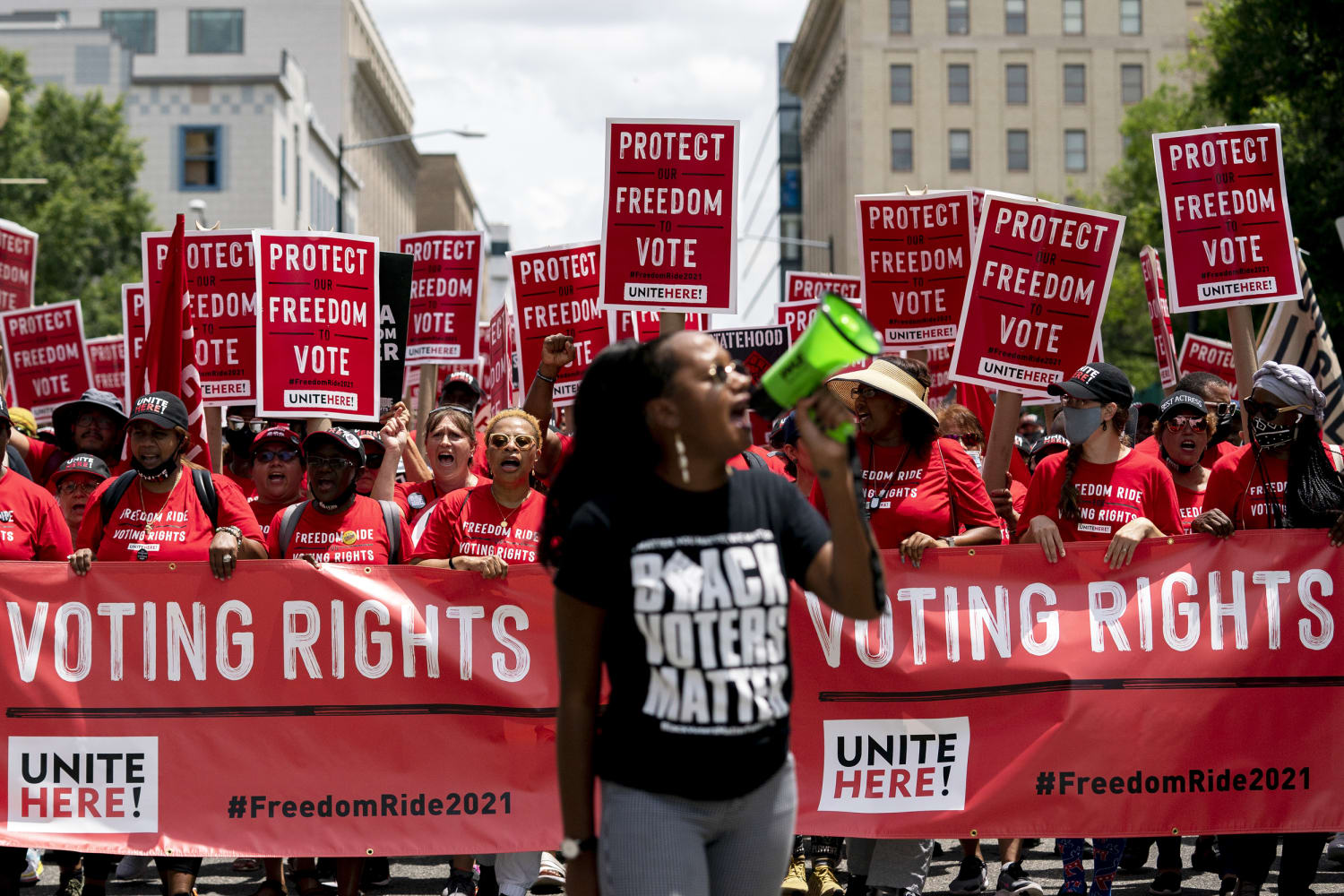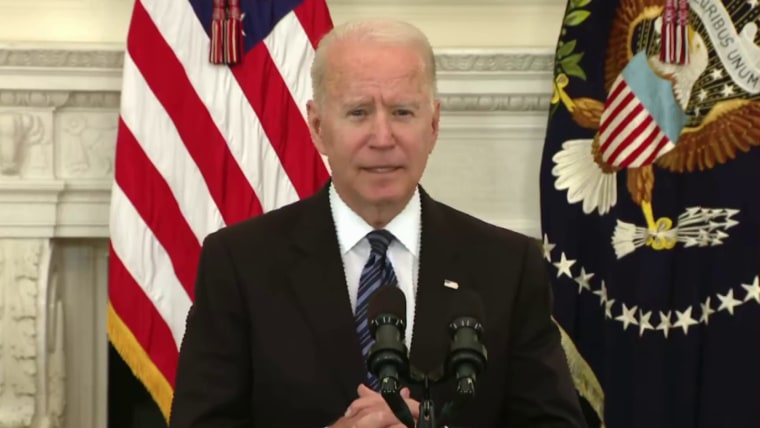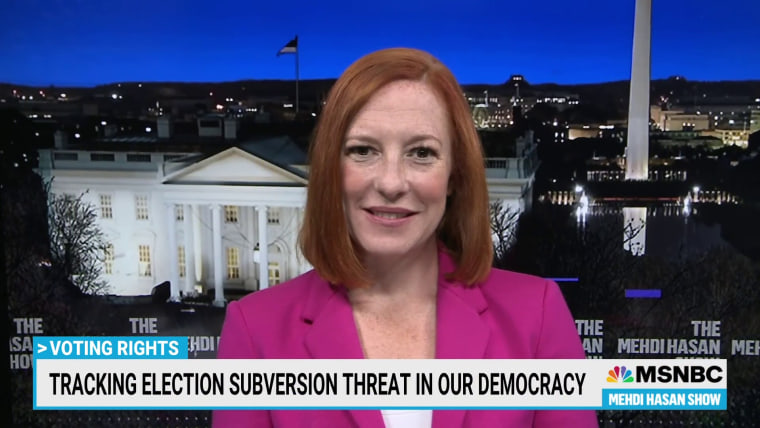PHILADELPHIA — President Joe Biden plans to blast the flurry of new Republican-backed voting law changes Tuesday as “the most egregious attempts to harm the integrity of our democracy since the Civil War” in the first part of what White House officials say will be a sustained effort to assemble a broad coalition to “overcome this un-American trend.”
Biden, who has faced growing pressure from Democratic activists and even close allies to make more aggressive use of the presidential megaphone on voting rights, is to argue in a long-promised major address that the sustained Republican effort to enact new stricter voting laws is “undemocratic, un-American and unpatriotic.”
Speaking steps from Independence Hall in Philadelphia, he plans to link the new voting laws to other historic voter disenfranchisement tactics, including poll taxes, literacy tests and voter intimidation tactics by groups like the Ku Klux Klan, a White House official said. And he is expected to single out changes that would threaten independent election administrators in favor of partisan actors as the most dire threat to America’s democracy.
As voting itself has become a partisan flashpoint, Biden’s address will be closely scrutinized in both parties — perhaps most of all by his fellow Democrats. No area may better demonstrate the state of the increasingly uneasy truce between Biden and his party’s activist base than the tactical divide between them over the issue.
Leading progressives, and even some of Biden’s traditional allies, have gone increasingly public with their frustration about what they see as Biden’s inaction in making the case for federal legislation to counter Republican-led voting law changes.
The White House defends Biden’s efforts on behalf of the For the People Act and says he will once again call for its passage Tuesday. But officials have been careful about how he uses his political capital, seeing a better use in mobilizing Democrats to put voting rights front and center in next year’s midterm elections.
“People consistently don’t give President Biden credit for being strategic and knowing exactly what to do, how to do it and when to do it,” White House senior adviser Cedric Richmond said in an interview.
Many Democrats say voting rights are urgent in the near term but don’t believe that view prevails in the White House, where Biden is taking a long view.
“What we emphasized to the president is that our backs are against the wall,” Sherrilyn Ifill, president of the NAACP Legal Defense and Educational Fund, told reporters. “We must have legislation. We must have the president use his voice, use his influence, use his power.”
Progressive groups have been more overtly critical, demanding that Biden use his bully pulpit not to work toward electoral wins next fall but to make the case now for amending Senate filibuster rules and enacting the For the People Act.
“I don’t think that the No. 1 crisis facing this country right now are our roads and bridges. I think the No. 1 crisis facing the country right now is rising fascism and a direct assault on democracy,” said Ezra Levin, a co-founder of Indivisible, a grassroots progressive organization.
Levin said Biden must offer more than just a stark warning about what’s at stake and a “passing endorsement” of the For the People Act, calling for “the launch of a campaign led by the White House to rally public opinion for this popular idea.”
Rep. James Clyburn of South Carolina, the third-ranking Democrat in the House, offered this stark warning as he called for Biden to support changing the filibuster.
“We screw up this voting thing and [Raphael] Warnock ain’t going to be in the Senate and we ain’t going to win nothing in North Carolina and we won’t have a chance down in Florida,” Clyburn said in an interview, referring to three Senate battlefields in the midterm elections where he suggested that there are fears that Black turnout could suffer because of Republican voting changes.
To Biden and his senior team, the kind of full-court public press activists wanted him to make ahead of a key Senate vote on voting rights last month wasn’t going to move enough Republican senators to secure final passage, and it could have cost him precious political capital when he needs it to advance a fragile bipartisan infrastructure package.
Instead, Biden focused on a more achievable task: working to ensure unanimity within the Democratic caucus — hardly a given, as Sen. Joe Manchin, D-W.Va., remained undecided until the last hours.
Richmond said: “We didn’t have 50 votes before that vote. The president worked the phone, and we got every Democratic senator. If they want a president who just runs around beating his chest talking hot air, they had that in the last president. This is a president who keeps his head down and does the work and tries to get to the result we need.”
Administration officials contend that while activists in both parties have been laser-focused on the debate, most Americans haven’t been. That’s the less ideological and politically focused audience Biden will be speaking to directly Tuesday and in the months to come.
The goal is to raise the stakes not just in House and Senate races next year but also in the kinds of local and state legislative races that ultimately have bigger impacts on voting laws. That’s why, when Biden was meeting with civil rights leaders at the White House about voting issues last week, Vice President Kamala Harris was firing the starting gun on what Democrats say will be a major electoral push on voting.
“Remember, this is not only about a national election,” Harris said. “This is also about state and local elections. It’s about who’s going to be your sheriff or your mayor or your school board member — the folks who get elected and then make decisions that impact your everyday life.”
She announced a $25 million initial investment by the Democratic National Committee — which the party says is its biggest and earliest ever — to register, educate and turn out voters while fighting voter suppression efforts at every level.
Democratic National Committee Chairman Jaime Harrison said in an interview: “I think the president wanted to see what was going to happen in terms of Congress’ movement on this. But what you’re about to see is a dramatic increase in terms of pushing from this administration and the Democratic Party to make sure that people understand that this is our most sacred right and it’s something that is worth investing in and fighting for.”
A White House official said Biden will call Tuesday for “a new coalition, made up of advocates, activists, students, faith leaders, labor leaders and business executives, to overcome this un-American trend and meet the moment as far as turnout and voter education.”
But some key Democrats are concerned that a strategy with an eye toward the midterm elections in 16 months could be ineffective if voter suppression tactics continue to sail through Republican-led states and counties before then.
Clyburn, whose efforts helped put the administration in office, is pushing Biden to support changes to the Senate filibuster that would allow voting-related bills to pass with simple majority votes.
“If we do what is necessary to allow people to cast an unfettered vote, we won’t have to worry about that, because we’ll win big-time in off-year elections,” he said. “But if we don’t, we’re going to lose big-time in off-year elections. First things first.”
Biden has thus far voiced support only for making it more difficult to mount filibusters, for instance by requiring senators to remain on the floor and speaking. Officials wouldn’t reveal whether advocating that kind of change would factor into Biden’s public case. Richmond said Biden speaks regularly with Manchin, among other lawmakers whose support for any major voting change would be critical.
Even as the White House lays the groundwork for a political fight over voting issues next fall, officials maintain that they are working closely with legislative leaders to find a path forward on another key voting rights measure that has yet to be fully written: a renewal of the Voting Rights Act named for the late civil rights icon John Lewis.
“Our goal is to sign something in this Congress sooner rather than later,” Richmond said.
Source: | This article originally belongs to Nbcnews.com












